2017年6月全国大学英语四、六级考试考场安排通知
英语四级真题2017年6月(第一套)试卷及答案解析
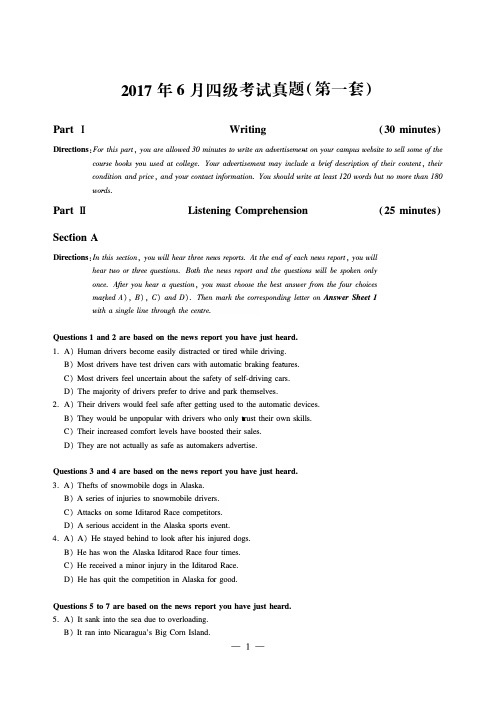
2017年6月四级考试真题(第一套)Part I Writing (30 minutes) ..ou are a owe minutes to write an advertisement on your campus website to sell some of the D1rect10ns: 的r this part, y ll d 30·course books you used at college. Your advertisement may include a brief description of their content, theircondition and price, and your contact information. You should write at least 120 words but no more than 180words.(25 minutes) Part II Listening ComprehensionSection A.Directions: In th· is section, you will hear three news reports. At the end of each news report, you willhear two or three questions. Both the news report and the questions will be spoken onlyonce. After you hear a question, you must choose the best answer from the four choicesmarked A), B), C) and D). Then mark the corresponding letter on Answer Sheet Iwith a single line through the centre.Questions 1 and 2 are based on the news report you have just heard.1.A) Human drivers become easily distracted or tired while driving.B)Most drivers have test driven cars with automatic braking features.C)Most drivers feel uncertain about the safety of self-driving cars.D)The majority of drivers prefer to drive and park themselves.2.A) Their drivers would feel safe after getting used to the automatic devices.B)They would be unpopular with drivers who only trust their own skills.C)Their increased comfort levels have boosted their sales.D)They are not actually as safe as automakers advertise.Questions 3 and 4 are based on the news report you have just heard.3.A) Thefts of snowmobile dogs in Alaska.B)A series of injuries to snowmobile drivers.C)Attacks on some Iditarod Race competitors.D)A serious accident in the Alaska sports event.4.A) A) He stayed behind to look after his injured dogs.B)He has won the Alaska Iditarod Race four times.C)He received a minor injury in the Iditarod Race.D)He has quit the competition in Alaska for good.Questions 5 to 7 are based on the news report you have just heard.5.A) It sank into the sea due to overloading.B)It ran into Nicaragua's Big Com Island.C)It disappeared between two large islands.D)It turned over because of strong winds.6.A) 13.C)30.7.A) He has helped with the rescue effort.B)He is being investigated by the police.C)He was drowned with the passengers.D)He is among those people missing. Section B B)25.D)32..Directions: 1几th'i s section, you will hear two long conversations. At the end of each conversation, you will hear four questions. Both the conversation and the questions will be spoken only once. After you hear a question, youmust choose the best answer from the four choices marked A) , B),C) and D) . Then mark thecorresponding letter on Answer Sheet 1 with a single line through the centre.Questions 8 to 11 are based on the conversation you have just heard.8.A) At a shopping centre.B)At a commumty college.C)At an accountancy firm.9.A) Helping out with data input.C)Sorting application forms.10.A) He enjoys using computers.C)He wants to work in the city centre.11.A) Purchase some business suits.C)Improve his programming skills.D)At an IT company.B)A盯anging interviews.D)Making phone calls.B)He needs the money badly.D)He has relevant working experience.B)Learn some computer language. D)Review some accountancy terms.Questions 12 to 15 are based on the conversation you have just heard.12.A) A) They are keen on high technology.B)They are poor at technology skills.C)They often listen to National Public Radio.D)They feel superior in science and technology.13.A) Japanese.C)Americans.14.A) Emailing.C)Science.15.A) It is undergoing a drastic reform.C)It has much room for improvement. Section C B)Poles.D)Germans.B)Texting.D)Literacy.B)It lays emphasis on creative thinking.D)It prioritizes training of practical skills.Directions: In this section, you will hear three passages. At the end of each passage ,you will hear three or four questions. Both the passage and the questions will be spoken only once. After you hear a question, you mustchoose the best answer from the four choices marked A) , B) , C) and D) . Then mark the correspondingletter on Answer Sheet 1 with a single line through the centre.Questions 16 to 18 are based on the passage you have just heard.16.A) They have small roots.B)They grow white flowers.C)They taste like apples.D)They come from Central Africa.17.A) They turned from white to purple in color.B)They became popular on the world market.C)They became an important food for humans.D)They began to look like modem-day carrots.18.A) They were found quite nutritious.B)There were serious food shortages.C)People discovered their medicinal value.D)Farm machines helped lower their prices.Questions 19 to 21 are based on the passage you have just heard.19.A) She could update her family any time she liked.B)She could call up her family whenever she liked.C)She could locate her friends wherever they were.D)She could download as many pictures as she liked.20.A) She liked to inform her friends about her success.B)She enjoyed reading her friends'status updates.C)She felt quite popular among them.D)She felt she was a teenager again.21.A) She could barely respond to all her 500 Facebook friends.B)She spent more time updating her friends than her family.C)She could barely balance Facebook updates and her work.D)She didn't seem to be doing as well as her Facebook friends.Questions 22 to 25 are based on the passage you have just heard.22.A) They have strong muscles.C)They live a longer life than horses.B)They eat much less in winter.D)They can work longer than donkeys.23.A) It was a pet of a Spanish king.B)It was bought by George Washington.C)It was brought over from Spain.D)It was donated by a U.S. ambassador.24.A) They met and exchanged ideas on animal breeding.B)They participated in a mule-driving competition.C)They showed and traded animals in the market.D)They fed mules with the best food they could find.25.A) The wider use of horses.C)A shrinking animal trade.B)The arrival of tractors.D)A growing donkey population.Part ID Reading Comprehension (40 minutes) Section ADirections: In this section, there is a passage with ten blanks. You are required to select one word for each blank f rom a list of choices given in a word bank following the passage. Read the passage through carefully before makingyour choices. Each choice in the bank is identified by a letter. Please mark the co汀esponding letter for eachitem on Answer Sheet 2 with a single line through the centre. You may not use any of the words in the bankmore than once.As if you needed another reason to hate the gym, it now turns out that exercise can exhaust not only your muscles, but also your eyes. Fear not, however, for coffee can stimulate them again. During26 exercise, our muscles tire as they run out of fuel and build up waste products. Muscle performance can also be affected by a 27 called "central fatigue," in which an imbalance in the body's chemical messengers prevents the central nervous system from directing muscle movements 28 . It was not known , however , whether central fatigue might also affect motor systems not directly 29 in the exercise itself, such as those that move the eyes. To find out, researchers gave 11 volunteer cyclists a carbohydrate (碳水化合物的)30 either with a moderate dose of caffeine (咖啡因),which is known to stimulate the central nervous system ,or as a placebo (安慰剂)without, during 3 hours of 31 . After exercising ,the scientists tested the cyclists with eye-tracking cameras to see how well their brains could still 32 their visual system. The team found that exercise reduced the speed of rapid eye movements by about 8%, 33 their ability to capture new visual information. The caffeine, the equivalent of two strong cups of coffee, was 34 to reverse this effect, with some cyclists even displaying 35 eye movement speeds. So it might be a good idea to get someone else to drive you home after that marathon.A)cautiously B)commit C)controlD)cycling E)effectively F)increasedG)involved H)limited I)phenomenonJ)preventing K)sensitive L)slowingM)solution N)sufficient O)vigorousSection Ba passage wit ten statements attac e to it. Each statement contains Directions: In讥is section ,you are going to read·h h d·information given in one of the paragraphs. Identify the paragraph from which the information is derived.You may choose a paragraph more than once. Each paragraph is marked with a letter. Answer the questionsby marking the corresponding letter on Answer Sheet 2.Team SpiritA)Teams have become the basic building blocks of organisations. Recruitment advertisements routinely call for"team players. " Business schools grade their students in part on their performance in group projects. Office managers knock down walls to encourage team building. Teams are as old as civilisation, of course: even Jesus had 12 co-workers. But a new report by Deloitte, "Global Human Capital Trends," based on a survey of more than 7,000 executives in over 130 countries, suggests that the fashion for teamwork has reached a new high.Almost half of those surveyed said their companies were either in the middle of restructuring or about to embark on (开始)it; and for the most part, restructuring meant putting more emphasis on teams.B)Companies are abandoning conventional functional departments and organising employees into cross-disciplinaryteams that focus on particular products, problems or customers. These teams are gaining more power to run their own affairs. They are also spending more time working with each other rather than reporting upwards. Deloitte argues that a new organisational form is on the rise: a network of teams is replacing the conventional hierarchy (等级体制).C)The fashion for teams is driven by a sense that the old way of organising people is too rigid for both the modemmarketplace and the expectations of employees. Technological innovation places greater value on agility (灵活性). John Chambers, chairman of Cisco Systems Inc. ,a worldwide leader in electronics products, says that "we compete against market transitions (过渡),not competitors. Product transitions used to take five or seven years; now they take one or two. "Digital technology also makes it easier for people to co-ordinate their activities without resorting to hierarchy. The "millennials" (千禧一代)who will soon make up half the workforce in rich countries were raised from nursery school onwards to work in groups.D)The fashion for teams is also spreading from the usual corporate suspects (such as GE and IBM) to some moreunusual ones. The Cleveland Clinic, a hospital operator, has reorganised its medical staff into teams to focus on particular treatment areas; consultants, nurses and others collaborate closely instead of being separated by speciality (专业)and rank. The US Army has gone the same way. In his book, Team of Teams ,General Stanley McChrystal describes how the army's hierarchicalstructure hindered its operations during the early stages of the Iraq war. His solution was to learn something from the rebels it was fighting: decentralising authority to self-organising teams.E)A good rule of thumb is that as soon as generals and hospital administrators jump on a management bandwagon(追随一种管理潮流),it is time to ask questions. Leigh Thompson of Kellogg School of Management in Illinois warns that, "Teams are not always the answer—teams may provide insight, creativity and knowledge ina way that a person working independently cannot; but teamwork may also lead to confusion, delay and poordecision-making." The late Richard Hackman of Harvard University once argued, "I have no question that when you have a team, the possibility exists that it will generate magic, producing something extraordinary. ..But don't count on it. "F)Hackman (who died in 2013) noted that teams are hindered by problems of co-ordination and motivation thatchip away at the benefits of collaboration. High-flyers (能干的人)who are forced to work in teams may be undervalued and free-riders empowered. Group-think may be unavoidable. In a study of旦Q teams of senior executives, he discovered that less than 10% of their supposed members agreed on who exactly was on the team.If it is hard enough to define a team's membership, agreeing on its purpose is harder still.G)Profound changes in the workforce are making teams trickier to manage. Teams work best if their members havea strong common culture. This is hard to achieve when, as is now the case in many big firms, a large proportionof staff are temporary contractors. Teamwork improves with time: America's National Transportation Safety Board found that 73% of the incidents in its civil-aviation database occurred on a crew's first day of flying together. However, as Amy Edmondson of Harvard points out, organisations increasingly use "team" as a verb rather than a noun: they form teams for specific purposes and then quickly disband them.H)The least that can be concluded from this research is that companies need to think harder about managing teams.They need to rid their minds of sentimentalism (感情用事):the most successful teams have leaders who are able to set an overall direction and take immediate action. They need to keep teams small and focused: giving in to pressure to be more "inclusive" is a guarantee of dysfunction. Jeff Bezos, Amazon's boss, says that "If I see more than two pizzas for lunch, the team is too big. "They need to immunise teams against group-think: Hackman argued that the best ones contain "deviants" (离经叛道者)who are willing to do something that maybe upsetting to others.I) A new study of 12,000 workers in 17 countries by Steelcase, a furniture-maker which also does consulting, findsthat the best way to ensure employees are "engaged" is to give them more control over where and how they do their work—which may mean liberating them from having to do everything in collaboration with others.J)However, organisations need to learn something bigger than how to manage teams better: they need to be in the habit of asking themselves whether teams are the best tools for the job. Team-building skills are in short supply: Deloitte reports that only 12% of the executives they contacted feel they understand the way people work together in networks and only 21 %feel confident in their ability to build cross-functional teams. Loosely managed teams can become hotbeds of distraction—employees routinely complain that they can't get their work done because they are forced to spend too much time in meetings or compelled to work in noisy offices. Even in the age of openplan offices and social networks some work is best left to the individual.36.Successful team leaders know exactly where the team should go and are able to take prompt action.37.Decentralisation of authority was also found to be more effective in military operations.38.In many companies, the conventional form of organisation is giving way to a network of teams.39.Members of poorly managed teams are easily distracted from their work.40.Teamwork is most effective when team members share the same culture.41.According to a report by Deloitte, teamwork is becoming increasingly popular among companies.42.Some team members find it hard to agree on questions like membership and the team's purpose.43.Some scholars think teamwork may not always be reliable, despite its potential to work wonders.44.To ensure employees'commitment, it is advisable to give them more flexibility as to where and how they work.45.Product transitions take much less time now than in the past.Section CDirections: There are 2 passages in this section. Each passage is followed by some questions or unfinished statements. For each of them there are four choices marked A) ,B), C) and D). You should decide on the best choice andmark the corresponding letter on Answer Sheet 2 with a single line through the centre.Passage OneQuestions 46 to 50 are based on the following passage.Shoppers in the UK are spending less money on toilet paper to save money ,research has shown.Penny-pinching UK consumers choose cheaper products from discounters such as Aldi and Lidl rather than luxury alternatives.This has wiped 6% off the value of the soft tissue paper market in the UK. It has shrunk from£1. 19 billion in 2011 to£1. 12 billion in 2015, according to a new report from market research company Mintel. Furthermore, the future of the market looks far from rosy ,with sales expected to fall further to£1. 11 billion in 2016.In the last year alone ,despite an increase in the UK population and a subsequent rise in the number of households, sales of toilet paper fell by 2 % , with the average household reducing their toilet roll spending from£43 in 2014 to£41 in 2015.Overall, almost three in five people say they try to limit the让usage of paper—including facial tissue and kitchen roll—to save money. "Strength, softness and thickness remain the leading indicators of toilet paper quality, with just a small proportion of consumers preferring more luxurious alternatives, such as those with flower patterns or perfume, "said Mintel analyst Jack Duckett. " T hese extra features are deemed unnecessary by the majority of shoppers ,which probably reflects how these types of products are typically more expensive than regular toilet paper,even when on special offer."While consumers are spending less on toilet paper, they remain fussy—in theory at least—when it comes to paper quality. Top of Britons'toliet paper wish list is softness (57%) followed by strength (45%) and thickness (36%).One in 10 buyers rank toliet rolls made from recycled paper among their top considerations, highlighting how overall the environment is much less of a consideration for shoppers than product quality. In a challenge for manufacturers ,81 %of paper product users said they would consider buying recycled toilet tissue if it were comparable in quality to standard paper.46. The market sales of toilet paper have decreased because.A)Britons have cut their spending on itB)its prices have gone up over the yearsC)its quality has seen marked improvementD)Britons have developed the habit of saving4 7. What does the author think of the future of the tissue paper market in the UK?A)It will expand in time.B)It will remam gloomy.C)It will experience ups and downs.D)It will recover as population grows.48. What does Jack Duckett say about toilet paper?A)Special offers would promote its sales.B)Consumers are loyal to certain brands.C)Luxurious features add much to the price.D)Consumers have a variety to choose from.49. What do we learn about Britons concerning toilet paper?A)They are particular about the quality of toilet paper.B)They emphasize the strength of toilet paper the most.C)They prefer cheap toilet paper to recycled toilet paper.D)They reject using toilet paper with unnecessary features.50. What can we infer from the last paragraph?A)More and more Britons buy recycled toilet paper to protect the environment.B)Toilet paper manufacturers are facing a great challenge in promoting its sales.C)Toilet paper manufacturers compete with one another to improve product quality.D)Environmental protection is not much of a concern when Britons buy toilet paper.Passage TwoQuestions 51 to 55 are based on the following passage."One of the reasons I find this topic very interesting is because my mom was a smoker when I was younger, " says Lindson-Hawley, who studies tobacco and health at the University of Oxford.By studying about 700 adult smokers ,she found out that her mom quit the right way—by stopping abruptly and completely.In her study, participants were randomly (随机地)assigned to two groups. One had to quit abruptly on a given day, going from about a pack a day to zero. The other cut down gradually over the course of two weeks. People in both groups used nicotine (尼古丁)patches before they quit ,in addition to a second form of nicotine replacement , like gum or spray. They also had talk therapy with a nurse before and after quit day.Six months out, more people who had quit abruptly had stuck with it—more than one-fifth of them, comparedto about one-seventh in the other group. Although these numbers appear low, it is much higher than if people try without support.And the quit rates were particularly convincing given that before the study started, most of the people had said they'd rather cut down gradually before quitting. "If you're training for a marathon, you wouldn't expect to turn up and just be able to run it. And I think people see that for smoking as well. They think,'Well, if I gradually reduce, it's like practice,"'says Lindson-Hawley. But that wasn't the case. Instead of giving people practice, the gradual reduction likely gave them cravi ngs (瘾)and withdrawal symptoms before they even reached quit day, which could be why fewer people in that group actually made it to that point. "Regardless of your stated preference, if you're ready to quit, quitting abruptly is more effective," says Dr. Gabriela Ferre让a." W hen you can quote a specific number like a fifth of the patients were able to quit, that's compelling. It gives them the encouragement, I think, to really go for it," Ferreira says.People rarely manage to quit the first time they try. But at least, she says, they can maximize the odds of success.51. What does Lindson-Hawley say about her mother?A)She quit smoking with her daughter's help.B)She succeeded in quitting smoking abruptly.C)She was also a researcher of tobacco and health.D)She studied the smoking patterns of adult smokers.52. What kind of support did smokers receive to quit smoking in Lindson-Hawley's study?A)They were given physical training.B)They were looked after by physicians.C)They were encouraged by psychologists.D)They were offered nicotine replacements.53.How does Dr. Gabriela Ferreira view the result of Lindson-Hawley's experiment?A)It is idealized.B)It is unexpected.C)It is encouraging.D)It is misleading.54.The idea of "a marathon" (Line 2, Para. 5) illustrates the popular belief that quitting smoking.A)is something few can accomplish B)needs some practice firstC)requires a lot of patience D)is a challenge at the beginning55. What happens when people try to quit smoking gradually?A)They find it even more difficult.B)They are simply unable to make it.C)They show fewer withdrawal symptoms.D)They feel much less pain in the process.Part IV Translation (30 minutes) Directions : 的r this part, you are allowed 30 minutes to translate a passage f rom Chinese into English. You should write your answer on Answer Sheet 2.长江是亚洲最长、世界上第三长的河流。
大学英语四六级考试PPT课件

在缺考考生答题卡1和答题卡2上的准考证号填涂
框内,用铅笔靠右填涂缺考考生准考证号的最后 两位,并用签字笔填写考生姓名。
监考流程:
9:55(六级15:55),第二次吹哨,收答题 卡1。提示考生准备接收听力。
10:00 (六级16:00),听力考试正式开始。 (监考教师原则上不允许走动,可制止其他 任何人在听力部分进入考场)听力考试结束 后,考生开始做试题的第四、五、六部分。
四级考试监考员操作规程
9:55 12、收答题卡1。 收卷期间考生不得答题,否则作违规违纪处
理。监考员乙收答题卡1,监考员甲监控整个 考场。
四级考试监考员操作规程
10:00 13、听力考试正式开始。(注:听力时间为35分钟
听力磁带AB双面都有内容) 注:听力部分考试时, 监考员原则上不要走动。若无试题、试题册的原因, 监考员有权制止其他任何人在听力部分考试进行时 进入考场(必须有一名监考员听听力,并记题号, 以便发生故障后从发生故障处开始播放听力)。 14、听力考试结束后,考生开始做试题的第四部分。
四级考试监考员操作规程
考 试 收 尾 收卷 19、监考员按座位号小号在上,大号在下的顺序
(包括缺考考生的答题卡)整理答题卡, 装订密封 20、将整理好的试题册、答题卡1、答题卡2、考场
记录单、考场座次表、磁带一并带到考务办公室, 经考务负责人清点核查无误后密封。 注:①考生的 答题卡1、答题卡2分别装入相应的专用袋内密封 (包括缺考考生)。 ②试题册装入试卷袋内密封 (包括缺考考生)。 六级与四级操作流程相同
装订试卷:
答题卡1、答题卡2、 试卷按编号顺序分别放入 相应的专用袋。
答题卡1、答题卡2、试卷专用袋封面上的各个项 目填写齐全。
全国公共英语等级考试报考须知
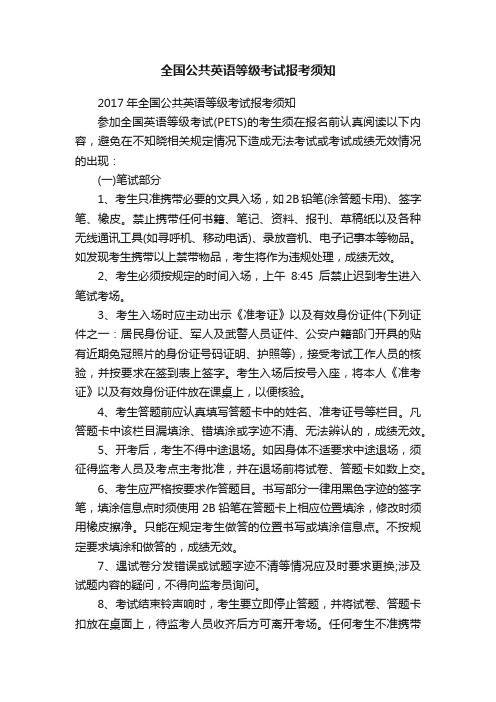
全国公共英语等级考试报考须知2017年全国公共英语等级考试报考须知参加全国英语等级考试(PETS)的考生须在报名前认真阅读以下内容,避免在不知晓相关规定情况下造成无法考试或考试成绩无效情况的出现:(一)笔试部分1、考生只准携带必要的文具入场,如2B铅笔(涂答题卡用)、签字笔、橡皮。
禁止携带任何书籍、笔记、资料、报刊、草稿纸以及各种无线通讯工具(如寻呼机、移动电话)、录放音机、电子记事本等物品。
如发现考生携带以上禁带物品,考生将作为违规处理,成绩无效。
2、考生必须按规定的时间入场,上午8:45后禁止迟到考生进入笔试考场。
3、考生入场时应主动出示《准考证》以及有效身份证件(下列证件之一:居民身份证、军人及武警人员证件、公安户籍部门开具的贴有近期免冠照片的身份证号码证明、护照等),接受考试工作人员的核验,并按要求在签到表上签字。
考生入场后按号入座,将本人《准考证》以及有效身份证件放在课桌上,以便核验。
4、考生答题前应认真填写答题卡中的姓名、准考证号等栏目。
凡答题卡中该栏目漏填涂、错填涂或字迹不清、无法辨认的,成绩无效。
5、开考后,考生不得中途退场。
如因身体不适要求中途退场,须征得监考人员及考点主考批准,并在退场前将试卷、答题卡如数上交。
6、考生应严格按要求作答题目。
书写部分一律用黑色字迹的签字笔,填涂信息点时须使用2B铅笔在答题卡上相应位置填涂,修改时须用橡皮擦净。
只能在规定考生做答的位置书写或填涂信息点。
不按规定要求填涂和做答的,成绩无效。
7、遇试卷分发错误或试题字迹不清等情况应及时要求更换;涉及试题内容的疑问,不得向监考员询问。
8、考试结束铃声响时,考生要立即停止答题,并将试卷、答题卡扣放在桌面上,待监考人员收齐后方可离开考场。
任何考生不准携带试卷、答题卡离开考场。
9、考生在考场内必须严格遵守考场纪律,对于违反考场规定、不服从监考人员管理和舞弊者,参照《国家教育考试违规处理办法(33号令)》处理。
2017年6月四级真题
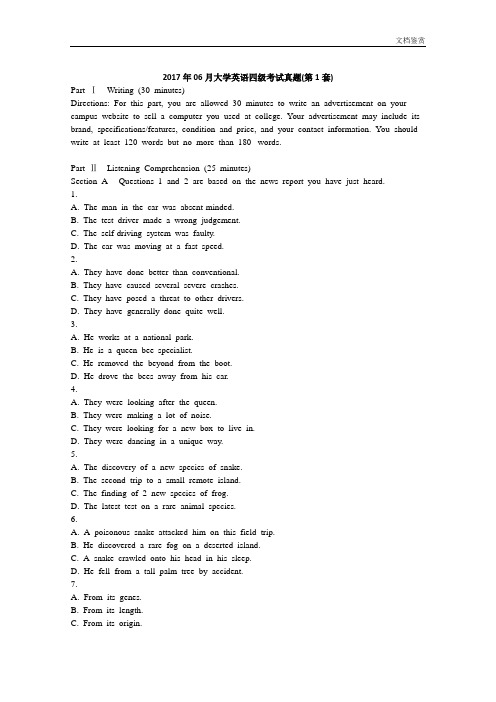
2017年06月大学英语四级考试真题(第1套)Part ⅠWriting (30 minutes)Directions: For this part, you are allowed 30 minutes to write an advertisement on your campus website to sell a computer you used at college. Your advertisement may include its brand, specifications/features, condition and price, and your contact information. You should write at least 120 words but no more than 180 words.Part ⅡListening Comprehension (25 minutes)Section A Questions 1 and 2 are based on the news report you have just heard.1.A. The man in the car was absent-minded.B. The test driver made a wrong judgement.C. The self-driving system was faulty.D. The car was moving at a fast speed.2.A. They have done better than conventional.B. They have caused several severe crashes.C. They have posed a threat to other drivers.D. They have generally done quite well.3.A. He works at a national park.B. He is a queen bee specialist.C. He removed the beyond from the boot.D. He drove the bees away from his car.4.A. They were looking after the queen.B. They were making a lot of noise.C. They were looking for a new box to live in.D. They were dancing in a unique way.5.A. The discovery of a new species of snake.B. The second trip to a small remote island.C. The finding of 2 new species of frog.D. The latest test on a rare animal species.6.A. A poisonous snake attacked him on this field trip.B. He discovered a rare fog on a deserted island.C. A snake crawled onto his head in his sleep.D. He fell from a tall palm tree by accident.7.A. From its genes.B. From its length.C. From its origin.D. From its colour.8.A. The security check takes time.B. He has to check a lot of luggage.C. His flight is leaving in less than 2 hours.D. The airport is a long way from the hotel.9.A. In cash.B. By credit card.C. With a traveler’s check.D. With his smart phone.10.A. Give him a receipt.B. Confirm his flight.C. Look after his luggage.D. Find a porter for him.11.A. Signing up for membership of S Hotel.B. Staying in the same hotel next time he comes.C. Loading her luggage onto the airport shuttle.D. Posting a comment on the hotel’s webpage.12.A. He is the only boy in his family.B. He becomes tearful in wind.C. He has stopped making terrible faces.D. He is his teacher’s favorite student.13.A. Tell him to play in her backyard.B. Do something funny to amuse him.C. Give him some cherry stones to play with.D. Warn him of danger by making up a story.14.A. They could break pp’s legs.B. They could sometimes terrify adults.C. They could fly against a strong wind.D. They could knock pp unconscious.15.A. One would get a spot on their tongues if they told a lie deliberately.B. One would have to shave their head to remove a bat in their hair.C. One would go to prison if they put a stamp on upside down.D. One would have curly hair if they ate too much stale bread.16.A. Everything seemed to be changing.B. People were formal and disciplined.C. People were excited to go traveling overseas.D. Things from the Victorian era came back alive.17.A. Watching TV at home.B. Meeting people.C. Drinking coffee.D. Trying new foods.18.A. He was interested in stylish dresses.B. He was able to make a lot of money.C. He was a young student in the 1960s.D. He was a man full of imagination.Questions 19 to 21 are based on the passage you have just heard.19.A. They avoid looking at them.B. They run away immediately.C. They show anger on their faces.D. They make threatening sounds.20.A. It turns to its owner for help.B. It turns away to avoid conflict.C. It looks away and gets angry too.D. It focuses its eyes on their mouths.21.A. By observing their facial features carefully.B. By focusing on a particular body movement.C. By taking in their facial expressions as a whole.D. by interpreting different emotions in different ways.Questions 22 to 25 are based on the passage you have just heard.22.A. They have to look for food and shelter underground.B. They take little notice of the changes in temperature.C. They resort to different means to survive the bitter cold.D. They have difficulty adapting to the changed environment.23.A. They have their weight reduced to the minimum.B. They consume energy stored before the long sleep.C. They can maintain their heart beat at the normal rate.D. They can keep their body temperature warm and stable.24.A. By staying in hiding places and eating very little.B. By seeking food and shelter in people’s houses.C. By growing thicker hair to stay warm.D. By storing enough food beforehand.25.A. To stay safe.B. To save energy.C. To keep company.D. To protect the young.Part ⅢReading Comprehension (40 minutes)Section ADirections: In this section, there is a passage with ten blanks. You are required to select one word for each blank from a list of choices given in a word bank following the passage. Read the passage through carefully before making your choices. Each choice in the bank is identified by a letter. Please mark the corresponding letter for each item on Answer Sheet 2 with a single line through the center. You may not use any of the words in the bank more than once.Questions 26 to 35 are based on the following passage.The method for making beer has changed over time. Hops, for example, which give many a modern beer its bitter flavor, are a _____(26)recent addition to the beverage. This was mentioned in reference to brewing in the ninth century. Now, researchers have found a _____(27)ingredient in residue(残留物) from 5000-year-old beer brewing equipment. While excavating two pits at a site in the central plains of China, scientists discovered fragments from pots, funnels, amphorae, and stoves (stove fragment pictured). The different shapes of the containers _____(28)they were used to brew, filter, and store beer. They may be ancient “beer-making toolkits,”and the earliest _____(29)evidence of beer brewing in China, the researchers report online today in the Proceedings of the National Academy of Sciences. To _____(30)that hypothesis, the team examined the yellowish, dried _____(31)inside the vessels. The majority of the grains, about 80%, were from cereal crops like millet and barley(大麦), and about 10% were bits of roots, _____(32)likely, would have made the beer sweeter, the scientists say. Barley was an unexpected find: The crop was domesticated in western Eurasia and didn’t become a _____(33)food in central China until about 2000 years ago, according to the researchers. Based on that timing, they suggest barley may have _____(34)in the region not as food, but as_____(35)material for beer brewing.A. arrivedB. consumingC. directD. exclusivelyE. includingF. informG. rawH. reachedI. relativelyJ. remainsK. resourcesL. stapleM. surprisingN. suggestO. testSection BDirections: In this section, you are going to read a passage with ten statements attached to it. Each statement contains information given in one of the paragraphs. Identify the paragraph from which the information is derived. You may choose a paragraph more than once. Each paragraph is marked with a letter. Answer the questions by marking thecorresponding letter on Answer Sheet 2.The Blessing and Curse of the People Who Never ForgetA handful of people can recall almost every day of their lives in enormous detail—and after years of research, neuroscientists are finally beginning to understand how they do it. A. For most of us, memory is a mess of blurred and faded pictures of our lives. As much as we would like to cling on to our past, even the saddest moments can be washed away with time.B. Ask Nima Verseh what he was doing for any day in the past 15years, however, and he will give you the details of the weather, what he was wearing, or even what side of the train he was sitting on his journey to work. “My memory is like a library of video tapes, walk-throughs of every day of my life from waking to sleeping,”he explains.C. Veiseh can even put a date on when those tapes started recording: 15 December 2000, when he met his first girlfriend at his best friend’s16th birthday party. He had always had a good memory, but the thrill of young love seems to have shifted a gear in his mind: from now on, he would start recording his whole life in detail. “I could tell you everything about every day after that.”D. Needless to say, people like Veiseh are of great interest to neuroscientists (神经科学专家) hoping to understand the way the brain records our lives. A couple of recent papers have finally opened a window on these people’s extraordinary minds. And such research might even suggest ways for us all to relive our past with greater clarity.E. ‘Highly superior autobiographical memory’(or HSAM for short) , first came to light in the early 2000s, with a young woman named Jill Price, Emailing the neuroscientist and memory researcher Jim McGaugh one day, she claimed that she could recall every day of her life since the age of 12. Could he help explain her experiences?F. McGaugh invited her to his lab, and began to test her: he would give her a date and ask her to tell him about the world events on that day. True to her word, she was correct almost every time.G. It didn’t take long for magazines and documentary film-makers to come to understand her “total recall”,and thanks to the subsequent media interest, a few dozen other subjects (including Verseh) have since come forward and contacted the team at the University of California, Irvine.H. Interestingly, their memories are highly self-centred: although they can remember “autobiographical”life events in extraordinary detail, they seem to be no better than average at recalling impersonal information, such as random (任意选取的) lists of words. Nor are they necessarily better at remembering a round of drinks, say. And although their memories are vast, they are still likely to suffer from “false memories”.Clearly, there is no such thing as a “perfect”memory—their extraordinary minds are still using the same flawed tools that the rest of us rely on. The question is, how?I. Lawrence Patihis at the University of Southern Mississippi recently studied around 20 people with HSAM and found that they scored particularly high on two measures: fantasy proneness (倾向) and absorption. Fantasy proneness could be considered a tendency to imagine and daydream, whereas absorption is the tendency to allow yur mind to become fully absorbed in an activity—to pay complete attention to the sensations (感受) and theexperiences. “I’m extremely sensitive to sounds, smells and visual detail,”explains Nicole Donohue, who has taken part in many of these studies. “I definitely feel things more strongly than the average person.”J. The absorption helps them to establish strong foundations for recollection, says Patihis, and the fantasy proneness means that they revisit those memories again and again in the coming weeks and months. Each time this initial memory trace is “replayed”,it becomes even stronger. In some ways, you probably go through that process after a big event like your wedding day—but the difference is that thanks to thir other psychological tendencies, the HSAM subjects are doing it day in, day out, for the whole of their lives.K. Not everyone with a tendency to fantasies will develop HSAM, though, so Patihis suggests that something must have caused them to think so much about their past. “Maybe some experience in their childhood meant that they became obsessed (着迷) with calendars and what happened to them,”says Patihis.L. The people with HSAM I’ve interviewed would certainly agree that it can be a mixed blessing. On the plus side, it allows you to relive the most transformative and enriching experiences. Verseh, for instance, travelled a lot in his youth. In his spare time, he visited the local art galleries, and the paintings are now lodged deep in his autobiographical memories.M. “Imagine being able to remember every painting, on every wall, in every gallery space, between nearly 40 countries,”he says. “That’s a big education in art by itself.”With this comprehensive knowledge of the history of art, he has since become a professional painter. N. Donohue, now a history teacher, agrees that it helped during certain parts of her education: “I can definitely remember what I learned on certain days at school. I could imagine what the teacher was saying or what it looked life in the book.”O. Not everyone with HSAM has experienced these benefits, however. Viewing the past in high definition can make it very difficult to get over pain and regret. “It can be very hard to forget embarrassing moments,”say Donohue. “You feel the same emotions—it is just as raw, just as fresh…You can’t turn off that stream of memories, no matter how hard you try.”Veiseh agrees: “It is like having these open wounds—they are just a part of you,”he says.P. This means they often have to make a special effort to lay the past to res. Bill, for instance, often gets painful “flashbacks”,in which unwanted memories intrude into his consciousness, but overall he has chosen to see it as the best way of avoiding repeating the same mistakes. “Some people are absorbed in the past but not open to new memories, but that’s not the case for me. I look forward to each day and experiencing something new.”36. People with HSAM have the same memory as ordinary people when it comes to impersonal information.37. Fantasy proneness will not necessarily cause people to develop HSAM.38. V erseh began to remember the details of is everyday experiences after he met his first young love.39. Many more people with HSAM started to contact researchers due to the mass media.40. People with HSAM often have to make efforts to avoid focusing on the past.41. Most people do not have clear memories of past events.42. HSAM can be both a curse and a blessing.43. A young woman sought explanation from a brain scientist when she noticed her unusual memory.44. Some people with HSAM find it very hard to get rid of unpleasant memories.45. A recent study of people with HSAM reveals that they are liable to fantasy and full absorption in an activity.Section CDirections: There are 2 passages in this section. Each passage is followed by some questions or unfinished statements. For each of them there are four choices marked A, B, C and D. You should decide on the best choice and mark the corresponding letter on Answer Sheet 2 with a single line through the center.Passage OneQuestions 46 to 50 are based on the following passage.The phrase almost completes itself: midlife crisis. It’s the stage in the middle of the journey when people feel youth vanishing, their prospects narrowing and death approaching.There’s only one problem with the cliché(套话) . It isn’t true.“In fact, there is almost no hard evidence for midlife crisis other than a few smallpilot studies conducted decades ago,”Barbara Hagerty writes in her new book, Life Reimagined. The bulk of the research shows that there may be a pause, or a shifting of gears in the 40s or 50s, but this shift “can be exciting, rather than terrifying.”Barbara Hagerty looks at some of the features of people who turn midlife into a rebirth. They break routines, because “autopilot is death.”They choose purpose over happiness—having a clear sense of purpose even reduces the risk of Alzheimer’s disease. They give priority to relationships, as careers often recede (逐渐淡化).Life Reimagined paints a picture of middle age that is far from gloomy. Midlife seems life the second big phase of decision—making. Your identity has been formed; you’ve built up your resources; and now you have the chance to take the big risks precisely because your foundation is already secure.Karl Barth described midlife precisely this way. At middle age, he wrote, “the sowingis behind; now is the time to reap. The run has been taken; now is the time to leap. Preparation has been made; now is the time for the venture of the work itself.”The middle-aged person, Barth continued, can see death in the distance, but moves with a “measured haste”to get big new things done while there is still time.What Barth wrote decades ago is even truer today. People are healthy and energetic longer. We have presidential candidates running for their first term in office at age 68, 69 and 74. A longer lifespan is changing the narrative structure of life itself. What could have been considered the beginning of a descent is now a potential turning point—the turning point you are most equipped to take full advantage of.46. What does the author think of the phrase “midlife crisis”?A. It has led to a lot of debate.B. It is widely acknowledged.C. It is no longer fashionable.D. It misrepresents real life.47. How does Barbara hagerty view midlife?A. It may be the beginning of a crisis.B. It can be a new phase of one’s life.C. It can be terrifying for the unprepared.D. It may see old-age diseases approaching.48. How is midlife pictured in the book Life Reimagined?A. It can be quite rosy.B. It can be burdensome.C. It undergoes radical transformation.D. It makes for the best part of one’s life.49. According to Karl Barth, midlife is the time .A. to relaxB. to matureC. to harvestD. to reflect50. What does the author say about midlife today?A. It is more meaningful than other stages of life.B. It is likely to change the narrative of one’s life.C. It is more important to those with a longer lifespan.D. It is likely to be a critical turning point in one’s life.Passage TwoQuestions 51 to 55 are based on the following passage.In sprint, chickens start laying again, bringing a welcome source of protein at winter’s end. So it’s no surprise that cultures around the world celebrate spring by honoring the egg.Some traditions are simple, like the red eggs that get baked into Greek Easter breads. Others elevate the egg into a fancy art, like the heavily jewel-covered “eggs”that were favored by the Russians starting in the 19th century.One ancient form of egg art comes to us from Ukraine. For centuries, Ukrainians have been drawing complicated patterns on eggs. Contemporary artists have followed this tradition to create eggs that speak to the anxieties of our age: Life is precious, and delicate. Eggs are, too.“There’s something about their delicate nature that appeals to me,”says New Yorker cartoonist Roz Chast. Several years ago, she became interested in eggs and learned the traditional Ukrainian technique to draw her very modern characters. “I’ve broken eggs at every stage of the process—from the very beginning to the very, very end.But there’s an appeal in that vulnerability. “There’s part of this sickening horror of knowing you’re walking on the edge with this, that I kind of like, knowing that it could all fall apart at any second.”Chast’s designs, such as a worried man alone in a tiny rowboat, reflect that delicateness.Traditional Ukrainian decorated eggs also spoke to those fears. The elaborate patternswere believed to offer protection against evil.“There’s an ancient legend that as long as these eggs are made, evil will not prevail in the world,”says Joan Brander, a Canadian egg-painter who has been painting eggs for over 60 years, having learned the art from her Ukrainian relatives.The tradition, dating back to 300 B.C., was later incorporated into the Christian church. The old Symbols, however, still endure. A decorate egg with a bird on it, given to a young married couple, is a wish for children. A decorated egg thrown into the field would be a wish for a good harvest.51. Why do people in many cultures prize the egg?A. It is a welcome sign of the coming of spring.B. It is their major source of protein in winter.C. It can easily be made into a work of art.D. It can bring wealth and honor to them.52. What do we learn about the decorated “eggs”in Russia?A. They are shaped like jewel cases.B. They are cherished by the rich.C. They are heavily painted in red.D. They are favored as a form of art.53. Why have contemporary artists continued the egg art tradition?A. Eggs serve as an enduring symbol or new life.B. Eggs have an oval shape appealing to artists.C. Eggs reflect the anxieties of people today.D. Eggs provide a unique surface to paint on.54. Why does Chast enjoy the process of decorating eggs?A. She never knows if the egg will break before the design is completed.B. She can add multiple details to the design to communicate her idea.C. She always derives great pleasure from designing something new.D. she is never sure what the final design will look like until the end.55. What do we learn from the passage about egg-painting?A. It originated in the eastern part of Europe.B. It has a history of over two thousand years.C. It is the most time-honored form of fancy artD. It is especially favored as a church decoration.Part IV Translation (30 minutes)Directions: For this part, you are allowed 30 minutes to translate a passage from Chinese into English. You should write your answer on Answer Sheet 2.黄河是亚洲第三、世界第六长的河流。
英语四级考试时间
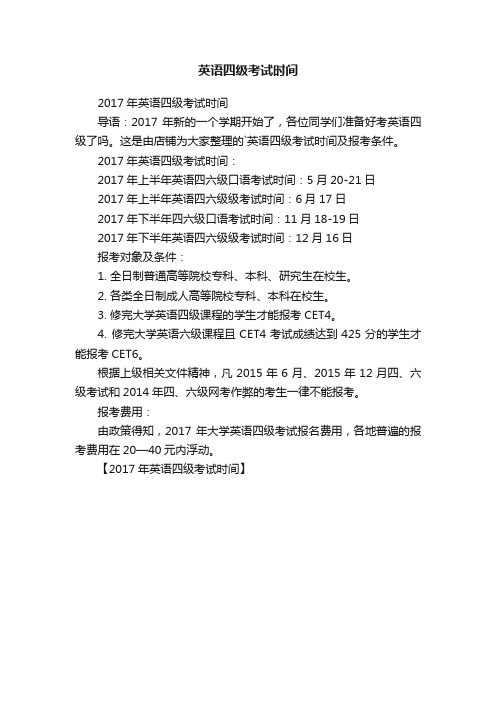
英语四级考试时间
2017年英语四级考试时间
导语:2017年新的一个学期开始了,各位同学们准备好考英语四级了吗。
这是由店铺为大家整理的`英语四级考试时间及报考条件。
2017年英语四级考试时间:
2017年上半年英语四六级口语考试时间:5月20-21日
2017年上半年英语四六级级考试时间:6月17日
2017年下半年四六级口语考试时间:11月18-19日
2017年下半年英语四六级级考试时间:12月16日
报考对象及条件:
1. 全日制普通高等院校专科、本科、研究生在校生。
2. 各类全日制成人高等院校专科、本科在校生。
3. 修完大学英语四级课程的学生才能报考CET4。
4. 修完大学英语六级课程且CET4考试成绩达到425分的学生才能报考CET6。
根据上级相关文件精神,凡2015年6月、2015年12月四、六级考试和2014年四、六级网考作弊的考生一律不能报考。
报考费用:
由政策得知,2017年大学英语四级考试报名费用,各地普遍的报考费用在20—40元内浮动。
【2017年英语四级考试时间】。
全国大学英语四、六级考试工作的管理办法——以西安财经大学为例

102023年02期总第650期ENGLISH ON CAMPUS全国大学英语四、六级考试工作的管理办法——以西安财经大学为例一、前言全国大学英语四、六级考试作为一项国家级英语等级考试,每年6月与12月举行,因试题难度梯度科学、考风严谨、侧重点全面,其对学校检测学生英语学习能力、用人单位考查入职人员英语水平具有重要参考价值。
近几年高校招生规模不断扩大,在校大学生数量激增,用人单位对入职人员英语水平的要求有所提高,所以,大学英语四、六级考试报名人数也大幅度增长。
以2021年6月、12月两次四、六级考试为例,陕西省普通全日制本科院校中有15所报名已经过万,其中三所985/211院校报名人数甚至逼近2万,占全校总人数的75%。
笔者所在西安财经大学这两次考试共设600个考场,参与考试的监考人员和考务工作人员达560人。
因为是全国性的标准化考试,所以管理难度巨大,考务工作极其繁重。
考务管理人员提前一个月便要开始进行大量的考前准备工作,如上报报名数据、报名系统编排、预定核对试卷、整理考场材料袋、放音设备检查等。
由于工作量大,工作人员较少,因此难免有纰漏发生。
在考试管理过程中,由于责任巨大、工作量繁重、时间紧迫,一套行之有效的科学的管理办法显得尤为重要,它可以使负责组织考试的相关工作人员提高工作效率,同时将出现失误的概率尽可能降低。
在这种背景下,笔者根据多年参与四、六级考试管理工作的经验总结出一套较为有效的管理办法。
二、规划管理(一)管理综述第一步,考位与考场规划。
自每年省考试院公布本次四、六级考试考务文件开始,对上次四、六级考试情况进行合理分析,预估本次参加考试的考生规模,根据考生规模初步制订方案,确定考位数与具体考场位置。
以西安财经大学为例,本校长安校区共有教学楼三栋,其中一号教学楼最大可容纳1750人参加考试,因此可以设置58个考场,其中常规考场50个,剩下8个为处理突发情况的应急考场。
第二步,规划本校考试文件。
大学英语四级 和六级考试时间冲突吗 分别是什么时候考试

内容介绍
一般不会冲突,在同一天考试,但是四级是在早上考试,而六级是在下午进行考试。 大学英语四级考试,即CET-4,College English Test Band 4的缩写,是由国家教育部高等教 育司主持的全国性英语考试。考试的主要对象是根据教育大纲修完大学英语四级的在校专科生、 本科生或研究生。 大学英语六级考试(又称CET-6,全称为“College English Test-6”)是由国家统一出题的, 统一收费,统一组织考试,用来评定应试人英语能力的全国性的考试,每年各举行两次。 大学英语考试是教育部主管的一项全国性的教学考试,其目的是对大学生的实际英语能力进行客 观、准确的测量,为大学英语教学提供服务。 大学英语考试是一项大规模标准化考试,在设计上必须满足教育测量理论对大规模标准化考试的 质量要求,是一个“标准关联的常模参照测验”。
同样,在2022年5月,上海市教育考试院发布公告,鉴于上海市新冠肺炎疫情防控的最新情况, 为了确保广大考生和涉考工作人员的健康,上海市原定于5月21日至22日举行的全国大学英语四、 六级口语考试(CET-SET)也被迫取消。这一决定,无疑给那些准备在考试中展示他们口语技能 的上海学生带来了巨大的失望,但也体现了考试院对公众健康的关爱和负责任的态度。
参考资料:大学英语六级考试
然而,2020年5月29日,教育部考试中心发布公告,根据党中央、国务院关于新冠肺炎疫情防控 工作的有关精神,原定于2020年6月13日举行的全国大学英语四、六级考试延期并分两次举行, 考试日期分别为7月11日和9月19日。这如同天空中的两颗明星,虽然暂时隐匿了光芒,但它们终 将在未来的日子里再次闪耀。 六级考试,这个熟悉又令人振奋的名字,它伴随着我们的青春,见证着我们的成长。让我们以梦 为马,不负韶华,用知识点亮我们的未来,用努力换取我们的成功。在CET-6的考场上,让我们 再一次挑战自我,超越极限,书写属于我们的辉煌篇章!
天津商业大学四六级考程
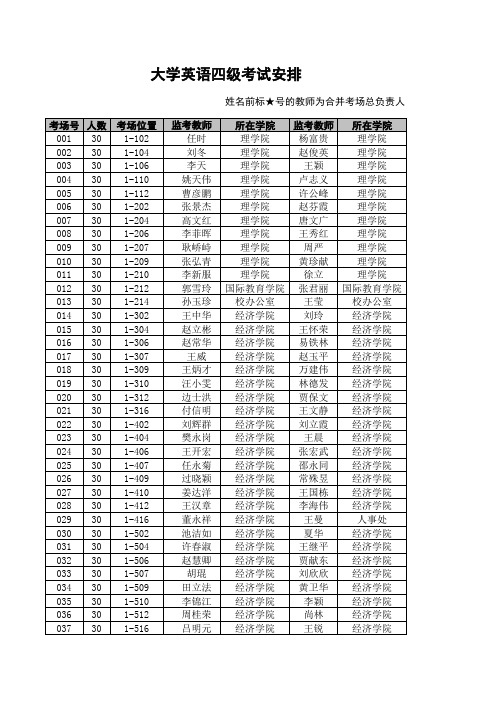
宗毅 赵春妮 蒋亦斌 邵艺瑾 于向华 赵宏伟 王焕嘉 马鸿民 王俊琪 刘剑 毛力 刘清江 刘万福 金梧凤 宁静红 张东明 律宝莹 张翌 薛京津 何云 林昊 李红 张韬 陈宗博 姜宁 李志 焦颖婕 李莉 段艳 张芝花 吴锦 刘国明 韩嵬 王慧 窦曼方 张晓娟 杨海艳 刘春瑜 芦雅楠 葛亚军 刘沛林 赵憬
王竹 高建伟 郭卫中 吴练达 李宁 冯延超 苗序娟 郭永梅 高珊 申芳 只德瑞 侯淑萍 陈琦 郭会娟 李海丰 孙云山 崔海霞 吴宝禄 杜利农 金辉 崔艳波 于柏 耿艳香 徐文超 费腾 郝丽萍 张志宇 朱诚 刘晓培 王晓艳 彭娟 郑鹏 李颖 席枫 杨琪 姜仁良 李晨 李勇军 杜志刚 陈桂生 郑园 郝建新
★
★
★
★
★
★
★
刘瑞亮 周惠萍 赵银红 陈燕玲 邢素军 王颖新 曹德仁 付林 崔文俊 马驰 李姗姗 吴常青 吕翎 姚海娟 蔡文霞 谢国财 孙德明 刘志勇 迟永梅 方泽 李国忠 李广慧 韩丽 岳晋充 李文华 马清珍 张金娟 王小明 宋海风 孙玉甫 王广辉 班景刚 李伟 纪寿乐 佟芳芳 唐婧清 薛洪岩 张雅杰 周丽丽 王茶 田小平 王艳芳
公共学院 公共学院 公共学院 法学院 法学院 法学院 法学院 法学院 法学院 法学院 法学院 法学院 法学院 法学院 法学院 法学院 商学院 商学院 商学院 商学院 商学院 商学院 商学院 商学院 商学院 商学院 商学院 商学院 商学院 商学院 商学院 商学院 商学院 商学院 商学院 商学院 商学院 商学院 商学院 商学院 商学院 商学院
30 30 30 30 30 30 30 30 30 30 30 30 30 30 30 30 30 30 30 30 30 30 30 30 30 30 30 30 30 30 30 30 30 30 30 30 30 30 30 30 30 30
2017年6月大学英语四级真题试卷及答案(第3套)
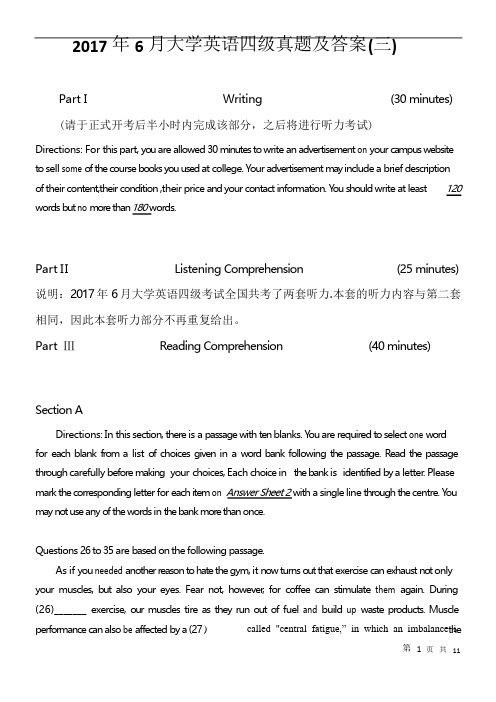
2017年6月大学英语四级真题及答案(三)Part I Writing(30minutes) (请于正式开考后半小时内完成该部分,之后将进行听力考试)Directions:For this part,y ou are allowed30minutes to write an advertisement on your campus website t o sell some o f the course bo o ks you used at college.Y our advertisement ma y include a brief description o f their content,their condition,their price and your contact information.Y ou should write at least120 words bu t no mor e than180words.Part II Listening Comprehension(25minutes)说明:2017年6月大学英语四级考试全国共考了两套听力.本套的听力内容与第二套相同,因此本套听力部分不再重复给出。
PartⅢReading Comprehension(40minutes)Section ADirections:In this section,there is a passage with t en blanks.Y ou are required to select one word for each blank fr om a list o f choices given in a word bank following the passage.R ead the passage through carefully before making your choices,Each choice in the bank is identified by a letter.Please mark the corresponding letter for each item on Answer Sheet2with a single line through the centre.Y ou may no t use any o f the words in t he bank mo r e than once.Questions26to35are based on the following passage.As if you needed another reason t o hat e the gym,it now turns ou t that exercise can exhaust no t only your muscles,bu t also your eyes.Fear not,however,for coffee can stimulate them again.During (26)_______exercise,our muscles tire as they run out of fuel and build up waste products.Muscle performance can also be affected by a(27)_______called"central fatigue,”in which an imbalance ithebody’s chemical messengers prevents the central nervous system from directing muscle movements (28)_______.It was no t known,however,whether central fatigue might also affect mo t or systems no t directly(29)_______in the exercise itself,such as those that move the eyes.T o find out,researchers gave11volunteer cyclists a carbohydrate(碳水化合物的)(30)_______either with a mo d er a t e do s e of caffeine(咖啡因),which is known to stimulate the central nervous system,or as a placebo(安慰剂)without,during3hours of(31)_______.After exercising,the scientists tested the cyclists with eye-tracking cameras t o see how well their brains could still(32)_______their visual system.The team found that exercise r educed the speed of rapid eye move ments by a bo u t8%,(33)_______their ability t o capture new visual information.The caffeine,the equivalent of two strong cups of coffee,was(34)_______t o reverse this effect,with some cyclists even displaying(35)_______eye mo v emen t speeds.So it might be a good idea to get someone else to drive you home after that marathon.注意:此部分试题请在答题卡2上作答。
认真组织好12月全国大学英语四六级考试和高等

教务通字[2017]17号关于认真组织好2017年6月全国大学英语四六级考试和高等学校大学英语应用能力考试的通知各学院、处、校区:2017年6月全国大学英语四、六级(CET)考试和普通高校大学英语应用能力(PRETCO-A)考试将于6月17—18日举行.为组织好此次考试,现将有关事项和安排通知如下:一、和地点(一)时间1、CET4:2017年6月17日上午9:00-11:202、CET6:2017年6月17日下午15:00—17:253、英语应用能力考试:2017年6月18日上午9:00-11:00(二)地点:1、CET4考试地点:河西考区:公共教学楼、包设楼、财商法楼、文外楼、电计楼工学院考区:主教学楼、电教楼2、CET6考试地点:河西考区:公共教学楼工学院考区:主教学楼3、英语应用能力考试地点:河西考区:公共教学楼工学院考区:主教学楼注意:以上教学楼在考试期间,教学楼封闭.考试期间有课的学院请提早按规定程序办理好调(停)课手续。
二、考试组织机构我校CET考点设两个考区:河西考区、工学院考区;英语应用能力考试设两个考区:河西考区、工学院考区.为了顺利组织和调配整个考试,根据省考试院文件精神,CET、PRETCO—A实行主考负责制,设主考办公室负责我校考点的全面工作,主考办公室下设若干个考区考务办公室.主考办公室成员:1、考务领导小组:组长:金继承副组长:陈艺锋ﻩ、周柏林、文爱军成员:刘常云、胡俊红、夏云强、陈益元、李正军、李永清、黄贤明、李石贤2、巡视人员:省市巡视员、唐未兵、谭益民、张亚东、监察处成员、督导团成员3、主考:金继承4、副主考:周柏林、文爱军5、考务专干:黎明、汪晓锋、罗成6、考区负责人:河西考区:周柏林、胡俊红工学院考区:刘常云、刘国亮7、考试违纪作弊事故处理小组组长:周柏林成员:各考区负责人、罗成、刘国亮及各学院学工系统人员8、后勤保障:许亮9、保密保卫:李永清及保卫处人员10、考场管理:现教中心人员三、考务办公室及收发卷地点1、主考办公室设在河西考区公共教学楼205-1室(电话:22183130)2、各考区考务办公室:河西考区考务办:公共教学楼203(电话:)工学院考区考务办:工学院主教楼305室(电话:)和电教楼403室(电话:22622964)3、试卷收发地点:1)河西考区:公共教学楼:203、204教室包设楼:209教室计算机楼:506教室财商法楼:商学楼109教室文外楼:外语楼308教室2)工学院考区:主教楼考场收发卷在主教楼313教室;电教楼考场收发卷在电教楼304室。
2017年6月全国大学英语四、六级考试考务工作说明

2017年6月全国大学英语四、六级考试考务工作说明一、CET考务流程要点二、考试材料说明1、以上为CET4、CET6考试材料说明,小语种考试材料说明详见各语种操作规程。
2、监考员在发放考试材料时,请务必提醒并帮助考生认真检查试题册背面条形码粘贴条、答题卡的印刷质量,如有问题及时向考务人员反映。
三、考务工作中如遇到条形码印刷异常(包括试题册封底没有条形码、有多个条形码或条形码损坏)时,各考点先按照异常情况处理办法处理,然后请将处理情况按照考务文件的要求进行汇总登记,送卷时一并上交至市级教育考试机构报省教育考试院,凡无异常说明且无条形码的答题卡将按照违规答题卡进行评判。
全国大学英语四、六级考试英语四级、英语六级监考工作注意事项1.考试题目在试题册上,全部题目在答题卡上作答,试卷类型通过试题册背面的条形码粘贴条进行区别。
2.考生须在考试时间内依次完成作文、听力、阅读、翻译部分考试内容,作文题目在试题册背面,考生在完成作文题期间即开考半小时内(CET4 9:10-9:40,CET6 15:10-15:40)不得翻阅试题册。
3.下发考试材料(四级9:00/CET6 15:00),监考员当众向考生展示试卷袋及磁带密封完好,当众启封并核对无误后开始发答题卡1及试题册,提示考生仔细阅读试题册正面的“敬告考生”内容,并指导考生在确认试题册封底的条形码粘贴条及答题卡无印刷质量问题后将试题册封底处的条形码揭下并粘贴于答题卡1指定位置上。
四级9:05、六级15:05监考员下发答题卡2。
注意:监考员在发试题册时应将试题册封底向上放置于考生座位的左上角,并且要求考生在听力考试开始前不得翻阅试题册,否则将按违规处理。
4.正式考试开始(CET4 9:10/CET6 15:10),考生开始作答作文部分,提示考生以下两点:(1)作文题目在试题册背面,使用黑色字迹的签字笔在答题卡1上作答,期间不得打开试题册。
(2)作文题考试时间为30分钟,之后将立即进行听力考试。
关于年12月全国大学英语及小语种四、六级考试的通知

关于2017年12月全国大学英语及小语种四、六级考试的通知各相关单位、各位考生:2017年下半年全国大学英语四、六级考试定于12月16日进行,上午为四级、下午为六级考试。
现就有关事项通知如下:一、考试语种、时间日期12月16日考试种类考试代码考试时间上午英语四级考试(CET4) 1 9:00-11:20下午英语六级考试(CET6) 2 15:00-17:25 二、考试地点考试类别学生所在校区考试地点大学英语四级屯溪路校区西二教学楼翡翠湖校区翠一教、翠三教、翠五教、翠七教、翠九教、翠十一教、翠二教、翠四教大学英语六级屯溪路校区西二教学楼、主教学楼翡翠湖校区翠一教、翠三教、翠五教、翠七教、翠九教、翠十一教、翠二教、翠四教三、考生注意事项(一)考生应记住考场所在地点,于考前15分钟(即四级:8:45、六级:14:45)开始入场。
入场有效证件即准考证、身份证、学生证,证件不齐者不准入场。
入场后在考场座位表上签名。
考试正式开始后,禁止迟到考生入场。
如有丢失准考证者,请于12月16日考试前登录网址自行下载并打印准考证,考试当天将无法打印。
(二)考生务必提前准备好所需的文具,试卷一律用黑色字迹笔书写,用2B 铅笔填涂相关信息。
不按规定要求填涂和做答的,一律无效,后果由考生自负。
(三)禁止携带任何书籍、笔记、资料、报刊、草稿纸、录放音机、电子词典、电子记事本以及各种无线通信接收器(如手机)等物品进入考场。
(四)考场内不得擅自相互借用文具。
凡携带手机等通讯设备及电子记事本、电子词典等物品进入考场且拒不交给监考员保管者,考试过程中一旦查出,不论开启与否均按违纪舞弊行为处理。
(五)本次考试英语四、六级听力全部采用调频播放,翡翠湖校区的频率为FM85MHz,屯溪路校区的频率为FM73.8MHz,参加考试的学生请自备具有调频接收功能的耳机。
同时,为了保证接收效果,屯溪路校区主教学楼同步采用环形天线(音频)播放听力,建议在主楼考试的学生自备具有调频/音频接收功能的耳机。
2017年6月大学英语四级真题及答案详解
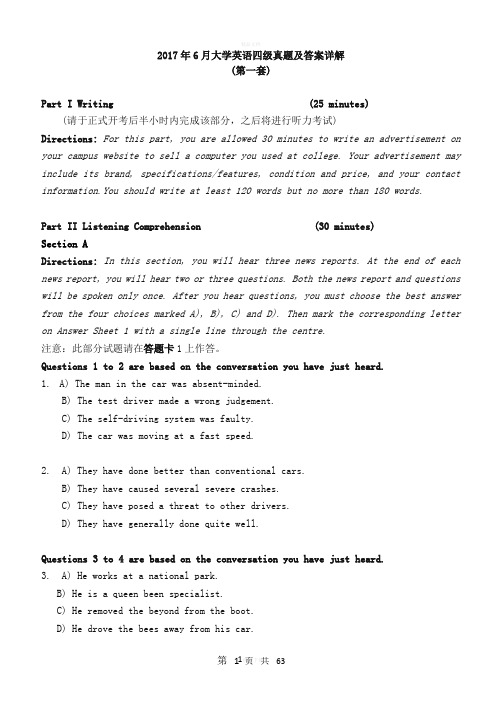
2017年6月大学英语四级真题及答案详解(第一套)Part I Writing (25 minutes)(请于正式开考后半小时内完成该部分,之后将进行听力考试)Directions:For this part, you are allowed 30 minutes to write an advertisement on your campus website to sell a computer you used at college. Your advertisement may include its brand, specifications/features, condition and price, and your contact information.You should write at least 120 words but no more than 180 words.Part II Listening Comprehension (30 minutes)Section ADirections:In this section, you will hear three news reports. At the end of each news report, you will hear two or three questions. Both the news report and questions will be spoken only once. After you hear questions, you must choose the best answer from the four choices marked A), B), C) and D). Then mark the corresponding letter on Answer Sheet 1 with a single line through the centre.注意:此部分试题请在答题卡1上作答。
大学英语四、六级考务工作管理的问题与对策

大学英语四、六级考务工作管理的问题与对策作者:高畅边传周来源:《法制博览》2017年第10期摘要:大学英语四、六级考试是全国性的教学考试,近年来出现考生人数激增,考试规模大,考生作弊翻新,缺考现象严重,考务管理不够规范等问题。
解决这些问题,应从强化责任意识,实施考务流程精细化管理,加强对考务人员管理和监考人员的遴选和培训,强化依法治考等方面着手,确保考试顺利进行。
关键词:四、六级考试;考务管理;问题;对策中图分类号:G642 文献标识码:A 文章编号:2095-4379-(2017)29-0240-02作者简介:高畅(1986-),女,河南淮阳人,硕士,河南牧业经济学院教务处,助教,研究方向:土地利用评价、农林经济管理;通讯作者:边传周(1965-),男,河南商丘人,河南牧业经济学院教务处处长,教授,硕士生导师,研究方向:微生物技术。
全国大学英语四、六级考试是由教育部高等教育司和考试中心组织的全国性统一的大学英语水平测试,其目的是对大学生的实际英语能力进行客观、准确的测量,是大学英语教学的一种重要的评价手段和激励机制。
近年来,大学英语四、六级考试出现报考人数多、考务管理人员责任重、工作量大等新情况,给考务管理带来很大挑战,这就需要强化考生诚信意识和监考工作人员权责意识。
[1]结合我院的四六级考试考务工作,对大学英语四、六级考试考务工作如何规范、科学地开展,谈一下个人观点。
一、大学英语四、六级考试的现状与问题(一)考生人数激增,考试规模大,执行监管艰巨近年来,基于解决经济和就业问题的需要,国家实行扩大普通高校本、专科院校招生人数的政策,在校大学生的数量激增,参加四、六级考试的学生人数大幅增长。
以2017年6月的四六级考试为例,笔者所在的河南牧业经济学院共有考生13747人,是我校四、六级考试历史上考生最多的一次,学校共设考场460个,考试地点分布在两个校区,需要监考老师、巡考人员、安保人员等1000人。
2017年6月大学英语四级考试真题(完整版)及答案
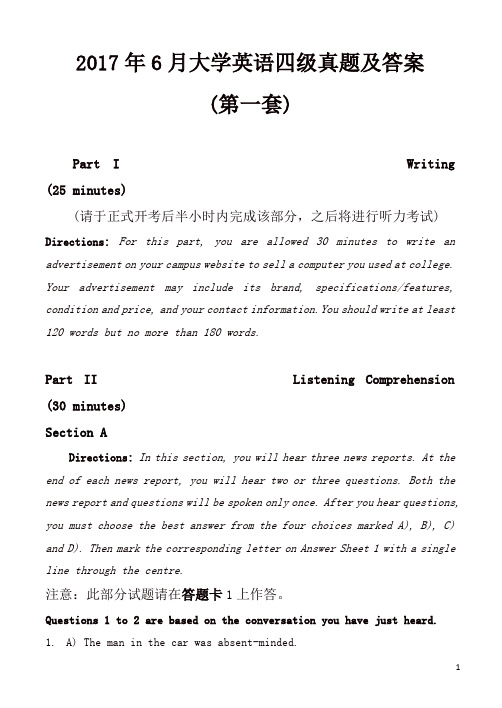
2017年6月大学英语四级真题及答案(第一套)Part I Writing (25 minutes)(请于正式开考后半小时内完成该部分,之后将进行听力考试) Directions:For this part, you are allowed 30 minutes to write an advertisement on your campus website to sell a computer you used at college.Your advertisement may include its brand, specifications/features, condition and price, and your contact information.You should write at least120 words but no more than 180 words.Part II Listening Comprehension (30 minutes)Section ADirections:In this section, you will hear three news reports. At theend of each news report, you will hear two or three questions. Both thenews report and questions will be spoken only once. After you hear questions,you must choose the best answer from the four choices marked A), B), C)and D). Then mark the corresponding letter on Answer Sheet 1 with a singleline through the centre.注意:此部分试题请在答题卡1上作答。
唐山师范学院2016~2017学年度

唐山师范学院2016~2017学年度第二学期期末考试工作安排各教学单位:现就我校2016~2017学年度第二学期期末考试工作安排通知如下。
请校内各单位根据本通知精神,安排好本单位期末教学、考试、阅卷、成绩登统以及学生离校工作,认真组织实施,并严格遵守成绩上报期限,各分校参照执行。
一、时间安排(一)毕业年级1.本科、专接本、专科毕业年级学生本学期5月24日前结课,考查课的考核同时结束;5月25日毕业班课程考试,5月27日前将毕业班课程考试成绩录入教务系统,纸质成绩单交教务管理科;6月1日毕业班课程补考,6月4日前将毕业班课程补考成绩录入教务系统,纸质成绩单交教务管理科。
2.毕业大补考时间安排在5月13-14日进行, 5月19日前将毕业班大补考成绩(纸质成绩单)交教务管理科。
3.学生考试结束后的活动另行通知。
4.为保证学生毕业时间,所有素质拓展课(公共选修课)于5月27日前结束期末考核工作,6月4日上午11:30前将成绩录入教务系统,纸质成绩单交开课系和教务管理科备份。
注意:本学期毕业年级的期末考试和毕业大补考考试地点统一安排到大学道校区北院文科楼主楼二层、三层教室(如有教师需要补课,请提前联系教务管理科高老师协调教室),各系院对应相应的时间段在以上教室内混排考试科目,尽量集中。
相应在各系院5月9日前上报《毕业班大补考监考安排表》纸质版、电子版(格式参考附加二);5月23日前上报《毕业班毕业学期期末考试监考安排表》纸质版、电子版;5月27日前上报《毕业班毕业学期期末补考监考安排表》纸质版、电子版,请各系院自行安排考试地点和监考教师。
(二)非毕业年级1.非毕业年级本学期6月18日前结课,6月19日—6月25日机动补课,期末考试工作安排在6月26日-7月9日进行。
请各系院务于7月11日12:00前将学生考试成绩交教务科。
2.凡教学计划规定的考试课程,考试均须在规定的时间内进行,未经教务处批准,不得提前或推后。
全国大学英语四、六级考试(CET)考务工作手册考点用【模板】

全国大学英语四、六级考试(CET)考务工作手册考点用山东省教育招生考试院印制2015年11月前言为方便CET考试工作人员及相关部门全面了解该项考试的规章制度、操作程序及实施办法,确保考试能够安全、顺利实施,我们参照教育部考试中心编制的《全国大学英语四、六级考试(CET)考务管理工作手册》,针对CET考试实施而印制了山东省《全国大学英语四、六级考试(CET)考务工作手册》。
监考及考试工作人员肩负着为国家选才的重任,监考及考试工作人员对维护国家考试的考风考纪,维护国家教育考试的严肃、公正、公平起着极其重要的作用。
为规范管理、特制定本工作手册。
监考及考试工作人员务必认真学习,严格执行本工作手册中的各项规程及要求。
山东省教育招生考试院二○一四年十一月目录考试实施 (1)第一节考点设置 (1)第二节考试工作人员的聘请、培训与考核 (2)第三节考试前的准备工作 (2)第四节考试材料领取 (3)第五节CET值班和报告制度 (4)第六节考试过程注意事项及有关问题的处理 (5)国家教育考试违规处理办法 (6)考生须知 (15)监考员守则 (18)CET4和CET6监考工作注意事项 (21)CET4、CET6试卷结构 (24)CET操作规程 (25)CET考务工作要点 (29)考试实施第一节考点设置一、考点应具备的条件:1.成立考试领导小组,组织、安排本考点该项考试的具体实施。
其中包括主考一人,副主考二人。
考点主考应由考点所在学校分管教学的副校长担任;副主考两名,分别由校教务处和外语系(部、教研室)负责人担任。
考点主考和副主考由省级教育考试机构聘任。
2.能够提供符合条件的考务办公室和考场。
3.能够提供符合听力考试要求的放音设备。
4.成立安全保卫、医疗等工作小组,确保考试的顺利进行。
5.执行有关规定,按照有关要求组织考试。
6.考前要对考试工作人员进行培训和考核。
7.考试期间,至少有一部考试专用长途电话,并在考前将电话号码报省级教育考试机构。
2017年下半年全国大学英语四六级考试

2017年下半年全国大学英语四六级考试2017年下半年全国大学英语四六级考试监考人员安排表一、2017年12月16日(星期六)上午四级考试1.科技大楼1-3楼考场(39个考场)考务办公室:9101教室2.科技大楼4-5楼考场(27个考场)考务办公室:9509教室3.科技大楼6-8楼考场(28个考场)考务办公室:9703教室4.教育大楼1-4楼考场(35个考场)考务办公室:1409教室5.教育大楼阶梯教室1—3楼和主楼7—8楼(33个考场)考务办公室:1101教室6.自控大楼1—6楼(16个考场)考务办公室:24017.人文大楼A座1—4楼(23个考场)考务办公室:21AT06教室二、2017年12月16日(星期六)下午六级考试1.科技大楼1-3楼考场(39个考场)考务办公室:9101教室2.科技大楼4-5楼考场(27个考场)考务办公室:9509教室3.科技大楼6-8楼考场(28个考场)考务办公室:9703教室备注:1.本次所有监考人员在考试当天(12月16日)上午7:30前到达指定地点签到并参加培训,由教务处负责人和考务组长负责进行培训。
要求所有监考人员不得迟到或不到,否则,将取消下次监考资格、记入监考档案并给予通报。
2.培训地点:科技大楼1-3楼监考人员在9101教室参加培训(培训人:陈强龚波);科技大楼4-8楼监考人员在9404教室参加培训(培训人:陈强周艳华)。
教育大楼监考人员在1J11教室参加培训(培训人:周秋莲钱靖)。
自控大楼监考人员在2401室参加培训(培训人:徐燕杨青胜)。
人文大楼监考人员在21AT05教室参加培训(培训人:秦海涛冯文娟)。
3.培训结束后,监考人员立即到各自的考务办公室领取试卷(具体分组见上表)。
4.监考人员必须佩戴监考牌进入考场,不得私换监考人员。
安排表中同一行的两个监考人员为一组,由监考员甲抽签决定监考考场,不得私自更换考场。
- 1、下载文档前请自行甄别文档内容的完整性,平台不提供额外的编辑、内容补充、找答案等附加服务。
- 2、"仅部分预览"的文档,不可在线预览部分如存在完整性等问题,可反馈申请退款(可完整预览的文档不适用该条件!)。
- 3、如文档侵犯您的权益,请联系客服反馈,我们会尽快为您处理(人工客服工作时间:9:00-18:30)。
2017年6月全国大学英语四、六级考试考场安排通知
(新校区)
本次全国大学英语四、六级考试将于2017年6月17日(星期六)进行,现将考试安排及有关事项通知如下:
1、考试时间:英语四级:上午09:00—11:20;英语六级:下午15:00—17:25
德语四级:上午09:00—11:10
法语四级:上午09:00—11:10
2、入场时间:上午08:40—09:00(09:00后禁止入场)
下午14:40—15:00(15:00后禁止入场)
3、考试凭证:考试时请务必带上准考证、身份证和学生证(或校园一卡通)。
6月12日起考生到所在院系办公室领取准考证,研究生到研究生处办公室领取。
请妥善保存准考证,并仔细阅读《考生须知》。
如准考证遗失必须由院系出具证明,贴上照片并加盖院系公章。
4、考试用具:自备黑色签字笔、2B铅笔、小刀、橡皮擦、直尺。
考试不允许带任何听力设备。
2017年6月8日
2017年6月全国大学英语四、六级考试考场安排通知(老校区)本次全国大学英语四、六级考试将于2017年6月17日(星期六)进行,现将考试安排及相关事项通知如下:
1、考试时间:英语四级:上午09:00—11:20;英语六级:下午15:00—17:25
日语四级:上午09:00—11:10
2、入场时间:上午08:40—09:00(09:00后禁止入场),
下午14:40—15:00(15:00后禁止入场)
3、考试凭证:考试时请务必带上准考证、身份证和学生证(或校园一卡通)。
6月12日起考生到公共艺术学院办公室领取准考证,研究生到研究生处办公室领取。
请妥善保存准考证,并仔细阅读《考生须知》。
如准考证遗失必须由院系出具证明,贴上照片并加盖院系公章。
4、考试用具:自备黑色签字笔、2B铅笔、小刀、橡皮擦、直尺。
考试不允许带任何听力设备。
教务处
2016年6月8日
声明:此资源由本人收集整理于网络,只用于交流学习,请勿用作它途。
如有侵权,请联系,删除处理。
